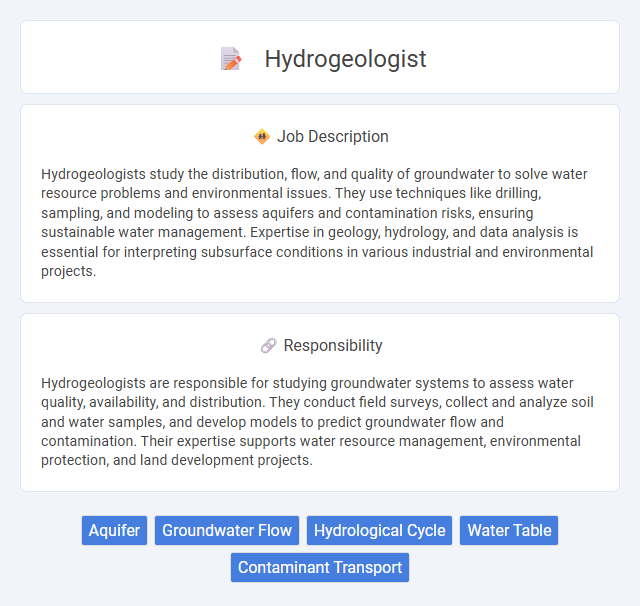
Hydrogeologists study the distribution, flow, and quality of groundwater to solve water resource problems and environmental issues. They use techniques like drilling, sampling, and modeling to assess aquifers and contamination risks, ensuring sustainable water management. Expertise in geology, hydrology, and data analysis is essential for interpreting subsurface conditions in various industrial and environmental projects.
Individuals with a strong interest in earth sciences and environmental studies are likely to find a career as a hydrogeologist suitable. Those comfortable with fieldwork, data analysis, and problem-solving in natural water systems may adapt well to the dynamic conditions of this role. People who thrive in outdoor settings and have a passion for protecting water resources probably have a higher chance of success and job satisfaction in hydrogeology.
Qualification
Hydrogeologists typically require a bachelor's degree in geology, environmental science, or a related field, with many employers preferring candidates who hold a master's degree specializing in hydrogeology or groundwater science. Strong analytical skills and proficiency in geological modeling software, such as MODFLOW or ArcGIS, are essential for assessing groundwater flow and contamination. Professional certification, like the Licensed Professional Geologist (LPG) or Certified Hydrogeologist credential, enhances job prospects and demonstrates expertise in hydrogeological investigations and environmental regulations.
Responsibility
Hydrogeologists are responsible for studying groundwater systems to assess water quality, availability, and distribution. They conduct field surveys, collect and analyze soil and water samples, and develop models to predict groundwater flow and contamination. Their expertise supports water resource management, environmental protection, and land development projects.
Benefit
Hydrogeologists likely enjoy benefits such as contributing to sustainable water resource management and environmental conservation. The role probably offers opportunities for fieldwork and research, promoting scientific discovery and practical impact. Job stability and growth prospects in environmental and government sectors are also expected advantages.
Challenge
Hydrogeologist roles likely involve complex challenges in balancing groundwater resource management with environmental sustainability. Navigating unpredictable subsurface conditions and addressing contamination risks could demand advanced analytical skills and innovative problem-solving approaches. Adapting to evolving regulatory requirements and climate change impacts may further complicate project planning and execution.
Career Advancement
Hydrogeologists specializing in groundwater resource management can advance to senior research scientist or project manager roles by gaining expertise in hydrogeology software and environmental regulations. Pursuing certifications such as Certified Hydrogeologist (CHG) or Professional Geologist (PG) enhances credibility and opens opportunities in consulting firms, government agencies, and environmental organizations. Leadership skills combined with experience in hydrogeological modeling and hydrochemical analysis accelerate progression to supervisory positions and policy advisory roles.
Key Terms
Aquifer
Hydrogeologists specialize in studying aquifers to understand groundwater flow, quality, and availability for sustainable water resource management. They use techniques such as drilling, sampling, and geophysical surveys to map aquifer characteristics and assess recharge rates. Expertise in aquifer dynamics is essential for developing strategies to prevent contamination and over-extraction, ensuring long-term water supply stability.
Groundwater Flow
Hydrogeologists specialize in analyzing groundwater flow to assess water availability, contamination risks, and aquifer recharge rates. They use advanced modeling software and field data to map subsurface water movement and predict changes in groundwater levels. Expertise in hydrogeology is critical for sustainable water resource management, environmental impact assessments, and remediation projects.
Hydrological Cycle
Hydrogeologists analyze the hydrological cycle by studying groundwater movement, recharge, and discharge processes to manage water resources effectively. They use advanced techniques such as groundwater modeling and isotopic analysis to assess aquifer properties and predict contaminant transport. Understanding precipitation, infiltration, evaporation, and subsurface flow is essential for sustainable groundwater management and environmental protection.
Water Table
Hydrogeologists specialize in studying the water table to understand groundwater levels and movement within aquifers. They analyze soil and rock permeability to assess water availability and quality, crucial for sustainable water resource management. Their expertise supports environmental impact assessments and groundwater contamination prevention.
Contaminant Transport
Hydrogeologists specializing in contaminant transport analyze the movement and fate of pollutants in groundwater systems using advanced modeling techniques and field sampling methods. They assess the risks posed by contaminants to water quality and develop remediation strategies to protect public health and environmental resources. Proficiency in hydrogeologic principles, geochemical behavior, and regulatory compliance is essential for effective management of subsurface contamination.
 kuljobs.com
kuljobs.com